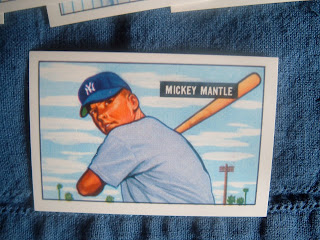
The 2010 Baseball Hall of Fame voting is over. There were no slam dunk candidates this year. Most of the sportswriters (who weren't voting) included Andre Dawson and Roberto Alomar on their imaginary ballots. Dawson cleared the hurdle but all others fell short.
In 1954, DiMaggio finished fourth in the Hall of Fame balloting, but once again failed to pass the 75% threshold. Maranville, Dickey and Terry all made the grade and entered the shrine. Finally, in 1955, he finished at the top of the class and sailed in with 88.8%. And yet, turning that number upside down, over 10% of the voters did not feel that Joe DiMaggio should enter the Hall of Fame. As Ted Williams learned during his MVP worthy seasons, there will always be a writer willing to tear a star down to size.
Many, many baseball fans and experts feel that Willie Mays is the greatest all-around player ever. Mays was elected in his first year of eligibility in 1979. He garnered 409 (94.7%) of the writers' votes. Some quick math reveals that 432 ballots were cast and 23 of them did not include Willie Mays.
But wait, it gets worse. Has anyone ever heard of Mickey Mantle? His election year was 1974. The Mick picked up 322 votes out of 365 possible (88.2%). That means 43 writers felt Mickey Mantle should not go into the Hall of Fame. That same year a total of 61 writers saw fit to include Phil Cavarretta on their ballots. No offense to Mr. Cavarretta and his family and fans, he had a long distinquished career with the Cubs and the White Sox. But I can't help but wonder if Mantle got bumped off any ballots to make room for Cavarretta. Voters have a limited number of names they can include on the ballot. Currently that limit is ten.
Another mind-boggling fact is the ramping up of a player's vote percentage as the years progress. Since Dawson's election is fresh news, let's examine his Hall of Fame vote-getting record.
2002 - 45.3 %
2003 - 50.0%
2004 - 50.0%
2005 - 52.3%
2006 - 61.0%
2007 - 56.7%
2008 - 65.9%
2009 - 67.0%
2010 - 77.9%
No player is eligible until five years after he has retired from active service. That means that Andre Dawson's credentials are locked in. Following his final 1996 season, he did not become more or less worthy as the years wore on. So why did the voting members of the BBWAA look more favorably some years, and less favorably in others? He is either Hall of Fame material or he isn't. The year 2007 mystifies me completely. His percentage of votes was actually lower than the previous year.
Are baseball statistics like the commodities market? Defensive skills dropped in value in 2007, but base stealing prowess spiked in 2010 pushing Dawson over the top?
So I now understand the wisdom of setting the threshold at 75%. The founding fathers of the Hall must have known how many writers would be blinded by city rivalries, regional bias, player position bias, and real or perceived slights and insults heaped on individual writers by the players on the ballot. Additionally, it was apparent to the founders that some writers are apparently just pinheads (feel free to substitute a ruder word).
Will baseball ever change the system? Not likely in my lifetime. But they should. I would like to see a smaller committee of baseball people (not necessarily writers) who will respect the game and the players who made it great. With today's many forms of communication, members of this committee could confer and discuss the pros and cons of the marginal candidates.
There is a precedence for the committee idea. The Hall utilizes a Veterans Committee to elect Pre-World War II and Post-World War II players who may have dropped through the cracks. Other committees exist to consider Umpires and Managers, and Executives and Pioneers.
I also think that the voting should be public. If a voter has the chutzpah to keep a Mickey Mantle or Willie Mays off his ballot, then let him (are there any hers?) stand up and defend the vote. My guess is that the petty grievances that underlie these preposterous votes would not stand the light of day. If one day in the future a writer keeps Randy Johnson or Greg Maddux off his ballot, I would like to know the reason(s).

I agree that the public should make the selection (from a field pre selected by qualifying under a minimum career performance level determined by MLB). The games are played to the fans. If the fans weren't there, there'd be no organized baseball. But, then you have to decide how an inductee is selected. Is it the top two (or other number) regardless of percent, those whose combined votes add to a fixed percentage of the total, or are we back to those individuals that receive more than a certain percent? When all is said and done, I would not be surprised if the same disappointing results continue to be obtained.
ReplyDelete